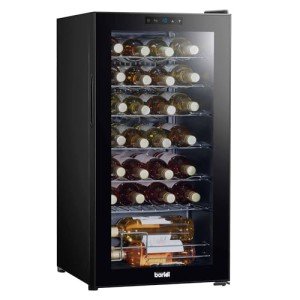5 Fridges Lessons From The Professionals

The Comprehensive Guide to Refrigerators: Types, Features, and Maintenance
Refrigerators, typically referred to as fridges, play a critical role in modern homes by preserving food, reducing waste, and maintaining a comfortable living environment. These essential cooking area home appliances have evolved significantly throughout the years in regards to technology, performance, and design. This article intends to supply an extensive summary of the numerous types of fridges, their features, and tips for upkeep, making it an indispensable resource for property owners.
Types of Refrigerators
Fridges can be found in various styles and setups, each dealing with different requirements and preferences. Below is a summary of the most typical kinds of fridges offered on the market today.
| Type of Refrigerator | Description |
|---|---|
| Top-Freezer | This is the timeless fridge design where the freezer compartment is located on top. It is generally the most budget-friendly option, making it popular for budget-conscious consumers. |
| Bottom-Freezer | In this design, the freezer is positioned at the bottom, permitting easy access to fresh items at eye level. This type frequently features pull-out drawers for much easier organization. |
| Side-by-Side | This model has the freezer and refrigerator compartments arranged vertically next to each other. It provides simple access to both areas and typically includes water and ice dispensers. |
| French Door | Combining the advantages of a bottom-freezer style with wide doors on the refrigerator section, French door fridges use adequate area and versatility, making them perfect for big families. |
| Compact | Also called mini-fridges, these smaller units are ideal for dormitory rooms, workplaces, or as secondary refrigerators in homes. They have actually limited storage but are energy-efficient. |
| Smart Refrigerators | Equipped with smart innovation, these fridges provide functions such as touch screens, web connection, and app controls. They can provide notifications for ended food and other wise performances. |
Key Features to Consider
When choosing a refrigerator, it is necessary to consider various features that can improve usability and efficiency. Here are some key features to look for:
Energy Efficiency
- Try to find designs with an Energy Star rating to ensure energy effectiveness and minimized energy bills.
Storage Options
- Adjustable racks, door bins, and specific compartments for fruits and vegetables boost the versatility of storage.
Water and Ice Dispensers
- Lots of side-by-side and French door models come with built-in water and ice dispensers, offering convenience and motivating hydration.
Temperature Control
- Accurate temperature level control enables homeowners to set optimal conditions for various food items.
Smart Features
- Functions like touchscreen user interfaces, Wi-Fi connection, and integrated video cameras to help handle grocery stocks make smart fridges attractive.
Noise Levels
- Think about models with low functional sound, particularly if the kitchen is open to the living location.
Maintenance Tips for Refrigerators
Proper maintenance can extend the life of a refrigerator and ensure optimal efficiency. Here are some beneficial upkeep tips:
Regular Cleaning:
- Clean the exterior and interior surface areas of the fridge with moderate soap and water a minimum of when a month.
- Get rid of spills instantly to avoid odors and germs growth.
Temperature level Settings:
- Maintain your refrigerator at a temperature level in between 35 ° F to 38 ° F and the freezer at 0 ° F for ideal food preservation.
Check Door Seals:
- Inspect the door seals periodically for fractures or tears. A faulty seal can cause energy loss and increased electrical energy costs.
Defrost Regularly:
- For manual defrost models, thaw the freezer when ice develops to reduce the home appliance's workload.
Condenser Coils:
- Clean the condenser coils at the back or below the refrigerator every six months to improve performance.
Keep it Level:
- Ensure the refrigerator is level for appropriate door positioning and to avoid vibrations.
Regularly Asked Questions (FAQs)
1. How long should carinabraeden.top ?Usually, a refrigerator can last anywhere from 10 to 20 years, depending upon the brand and upkeep practices.
2. How can I improve the energy efficiency of my refrigerator?To improve energy efficiency, keep the fridge's temperature level settings ideal, regularly tidy the condenser coils, and avoid placing hot food within.
3. What kind of refrigerator is best for small kitchen areas?Compact or counter-depth designs are perfect for small cooking areas as they offer adequate storage without occupying excessive area.
4. Are wise refrigerators worth the financial investment?Smart fridges can be worth the investment if you value benefit and technology. They offer performances like stock management and remote access, which deal with tech-savvy users.
5. How can I troubleshoot a refrigerator that is not cooling properly?Start by examining the temperature settings, ensuring the condenser coils are tidy, and validating that the door seals are undamaged. If these do not solve the problem, think about calling a professional specialist.
In conclusion, refrigerators are essential appliances that play a vital role in protecting food and keeping a healthy way of life. With a variety of types and features offered, it is vital for consumers to select a model that lines up with their particular needs. By understanding the options and adhering to upkeep best practices, property owners can enjoy the benefits of their refrigerators for several years to come.

